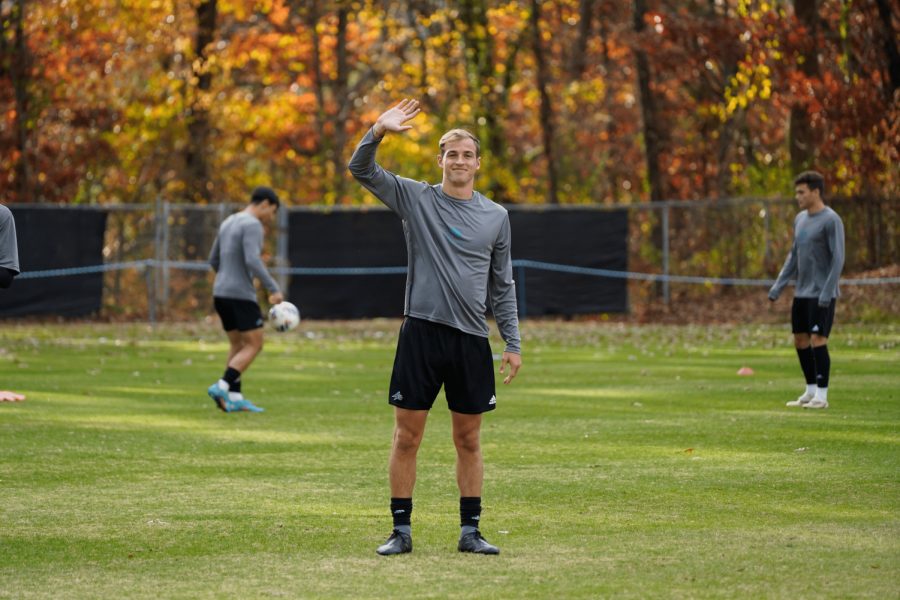Student-athletes look to end stigma around mental health
Junior midfielder Justin Fleer waves to the camera during warmups.
November 21, 2022
Mental health remains a key issue amongst student-athletes, whose schedules differ from the average student as they must balance practice, strength and conditioning, homework, their social life and other things life may throw at them.
Three students offered their perspectives on the impact of social media, their ways of keeping a healthy mind and how to end the stigma around mental health.
Justin Fleer, a mental health ambassador who just completed his junior season with the men’s soccer team, said sharing resources and stories of students’ struggles are important when it comes to providing for the needs of fellow athletes.
“The more we talk about it, they know it’s OK to talk about it. I think the people who signed up for the ambassador program have had their own struggles with mental health and have gotten to the point where that’s not something to hide from and is something to be open about and live with,” Fleer said.
Bri Bitz, a forward on the women’s soccer team, said she and her fellow ambassadors are trying to create an environment where vulnerability and inclusion are safe and comfortable for athletes on campus.
“As mental health ambassadors, we provide resources while being an example of coming forward. Sharing our own struggles and stories is going to help people here. It’s going to bring a better environment here and across all colleges, and help bring down the mental health stigma,” Bitz said.
Fleer and Bitz both sang the praises of Dr. Laura K. Jones, the mental health coordinator for UNCA athletics.
“I think it’s great that we have Dr. Jones over us because she is amazing and completely understands the student-athlete experience and the things we go through,” Bitz said.
For years, many people who have struggled with their mental health have had to fight the stigmas around the issue. Cameron Johnson, an infielder for the Bulldogs baseball team, said the stigma stems from the lack of understanding, ignorance and being afraid of acknowledging and accepting the issue.
“As a society, I believe that there have been improvements in our healthcare system along with increased awareness which is great. There’s been a perception of mental health over the years that carries this stigma that we have to continue to break down,” Johnson said.
Bitz said a big part of the stigma is the idea that you have to be strong and even-keeled, not being allowed to show emotion when things get tough.
“From generation to generation, you’re taught to be strong and not show these issues or ‘you’re not really battling these issues, it’s just in your head.’ In reality, things are going on but we don’t want to talk about them because we have been conditioned into thinking that we’re supposed to be strong,” Bitz said.
Fleer added that people see athletes as spoiled kids with everything they want and need to succeed when in reality that is far from the case.
“Honestly, people don’t know or understand how hard everyone else’s life is. They always say ‘oh, I have it bad and everyone else has it easy.’ Most people have it bad in some capacity,” Fleer said.
Bitz, Fleer and Johnson have their ways of keeping a calm and healthy mind with their hectic and overwhelming schedules. Bitz said it is important to slow down and find time, even a sliver of it, to breathe and reset.
“I have to go from practice to class to tutoring and find, even if it’s five minutes, to just take a breath, slow down and realize that all of these activities don’t define you and that you’re an actual human being outside of these things,” Bitz said.
Soccer and baseball have some of the most grueling schedules due to the number of games played each week. Fleer has encouraged himself and his teammates to find hobbies to do outside of practice and games to get away from the sport in order to keep a healthy mind.
“I like to read. It’s a little cold right now, but I like to go on walks. It’s finding little times in the day to shut everything off and get away and I get to take a breath for once,” Fleer said.
Johnson said keeping a healthy mind comes down to maintaining a healthy balance of everyday life as an athlete, especially during the season when there are multiple games per week.

“It helps to have something to look forward to, like seeing a close friend or family coming to visit. I resort to what makes me happiest and what brings me peace of mind amidst busy and stressful times,” Johnson said.
Bitz said the impact of social media on mental health can go both ways, good or bad, explaining that most of her Instagram feed is motivational.
“My feed is more of a Pinterest than an actual Instagram feed,” Bitz said jokingly.
Bitz said seeing the success of other popular athletes on social media while having to deal with the daily battle of managing time during the day can be hard for her.
“The truth is that behind closed doors they could be completely down and out. Yet, social media is making them look like they’re on top of the world. I think that’s where it can go wrong,” she said.
Johnson said social media can portray someone for something they are not, explaining that comparison is the thief of all joy.
“It’s never as pretty as it may look. On the flip side, social media can bring positivity and interaction that benefits us student-athletes for the better,” he said.
When it comes to social media, as Fleer explains, people can curate their social media feeds to how they want to be seen, and that being on a quieter campus can help with that compared to being on a bigger campus with popular athletes.
“The five-star athletes with thousands of followers are more fans than friends — after a bad game everyone in the comments will be like ‘who do you think you are?’ Luckily, I don’t have a following like that, so when I post, no one is saying anything like ‘you don’t deserve to play anymore, get the backups in,’”Fleer said.
Fleer notes that it can be hard to see different popular athletes on TikTok with name, image and likeness deals that allow them to make tens of thousands of dollars and make comparisons. However, he understands they too might be having their own struggles.
“You can let it be all positive or follow a bunch of five-star athletes with million-dollar brand deals. What did they do in their 18 years versus what I did in my 18 years before college? It’s hard to see that and I think it gets worse the higher up you go,” Fleer said.
The junior mentioned the recent suicides of student-athletes across the country earlier in the year and how the high followings on social media can still impact an athlete’s mental state.
“A volleyball player I follow that plays at Texas Tech posted a long paragraph about her mental health and the mental health of her friends. This was in the wake of last spring when there were student-athletes committing suicide what felt like every week. It feels like from the outside looking in that the student-athletes, national champions and all, are doing well when they actually aren’t,” Fleer said.
On the UNCA athletics mental health and support page, the mission statement explains that the athletic department is dedicated to the holistic well-being of student-athletes and coaches while stating mental health should be prioritized along with sports-specific practices, medicine, nutrition, and strength training.
Student-athletes can contact Dr. Jones and mental health advisor Dr. Jadarius Jackson for finding mental health care via email at [email protected] and [email protected]


















